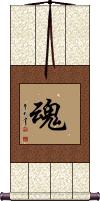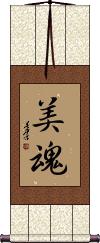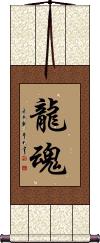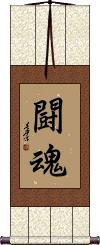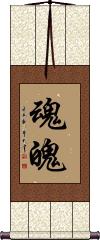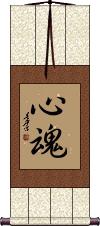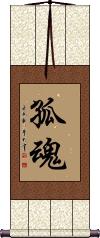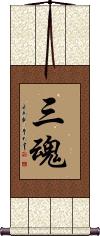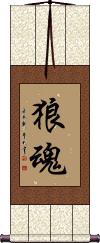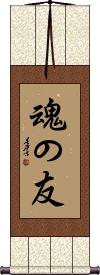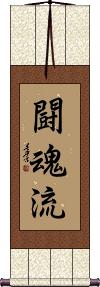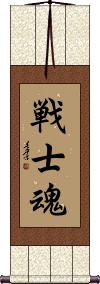Many custom options...
And formats...

魂 in Chinese / Japanese...
Buy an 魂 calligraphy wall scroll here!
Personalize your custom “魂” project by clicking the button next to your favorite “魂” title below...
8. Three Souls
9. Wolf Spirit / Soul of a Wolf
10. Soul Mates
11. Toukon-Ryu
12. Warrior Soul / Spirit of a Fighter
13. Beautiful Soul
15. Lost Soul
16. Soul Mates
18. Beautiful Soul
Soul / Spirit
魂 means soul or spirit as in the immortal soul that can be detached from the body.
This can also refer to one's Yang energy or spirit.
In the Buddhist context, this can be the soul, conscious mind, or vijñāna.
Beautiful Soul
Dragon Spirit
Fighting Spirit
Alternate Japanese version
Ghost / Soul / Spirit
魂魄 is a Chinese, Japanese Kanji, and old Korean Hanja term for ghost, soul, or spirit.
It's used in the context of Buddhism as:
Animus and anima; the spiritual nature or mind, and the animal soul; the two are defined as mind and body or mental and physical, the invisible soul inhabiting the visible body, the former being celestial, the latter terrestrial.
Heart and Soul
心魂 is “heart and soul” in Japanese Kanji.
The first character means heart (but can also mean mind or soul).
The last character means soul or spirit (spiritual essence).
Lonely Soul / Lost Soul
孤魂 is a Chinese title that means “lonely soul.”
In the context of being a soul without a mate or all alone, this can be translated as a “lost soul.”
Three Souls
Wolf Spirit / Soul of a Wolf
Soul Mates
魂の友 is one of a few ways to write “Soul Mates” in Japanese.
The first Kanji means soul, spirit, ghost, immortal soul, the mind, or conscious mind. From Sanskrit, it's Vijñāna.
The middle character is a Japanese Hiragana connecting or possessive article that links the two ideas together.
The last Kanji means friends or friendship.
Toukon-Ryu
Warrior Soul / Spirit of a Fighter
Beautiful Soul
Indomitable Spirit
Lost Soul
Soul Mates
靈魂伴侶 is the literal translation of “Soul Mates.”
This is kind of the western way to express “soul mates” but translated into Chinese, Japanese Kanji, and old Korean Hanja.
The first two characters mean “soul” or “spirit.”
The second two characters mean “mate,” “companion” or “partner.”
Although not the most common title, these characters have good meaning and will be received well in Chinese, Japanese, and Korean. It's a universal title!
Spiritual Soul Mates
魂の伴侶 is a Japanese-only title for soulmates.
魂 means soul, spirit, immortal soul (the part of you that lives beyond your physical body), or the conscious mind. In the Buddhist context, this is vijñāna or viññāṇa (consciousness, life force, or mind).
の is a possessive article that connects everything here.
伴侶 means mates, companions, partners, and spouses.
Beautiful Soul
Spirit Of The Dragon Martial Arts
Not the results for 魂 that you were looking for?
Below are some entries from our dictionary that may match your 魂 search...
| Characters If shown, 2nd row is Simp. Chinese |
Pronunciation Romanization |
Simple Dictionary Definition |
魂 see styles |
hún hun2 hun kokoro こころ |
More info & calligraphy: Soul / Spirit(See 魄) Yang energy; spirit; (female given name) Kokoro The mind, the soul, conscious mind, vijñāna; also 魂神. |
三魂 see styles |
sān hún san1 hun2 san hun |
More info & calligraphy: Three Souls |
孤魂 see styles |
gū hún gu1 hun2 ku hun |
More info & calligraphy: Lonely Soul / Lost Soul |
心魂 see styles |
shinkon しんこん |
More info & calligraphy: Heart and Soul |
闘魂 see styles |
toukon / tokon とうこん |
More info & calligraphy: Fighting Spirit |
魂魄 see styles |
hún pò hun2 po4 hun p`o hun po konpaku こんぱく |
More info & calligraphy: Ghost / Soul / Spiritsoul; spirit; ghost Animus and anima; the spiritual nature or mind, and the animal soul; the two are defined as mind and body or mental and physical, the invisible soul inhabiting the visible body, the former being celestial, the latter terrestrial. |
喪魂失魄 丧魂失魄 see styles |
sàng hún shī pò sang4 hun2 shi1 po4 sang hun shih p`o sang hun shih po |
More info & calligraphy: Lost Soul |
負けじ魂 see styles |
makejidamashii / makejidamashi まけじだましい |
More info & calligraphy: Indomitable Spirit |
䰟 魂 see styles |
hún hun2 hun |
old variant of 魂[hun2] See: 魂 |
一魂 see styles |
ikkon いっこん |
(given name) Ikkon |
丟魂 丢魂 see styles |
diū hún diu1 hun2 tiu hun |
to be distracted |
亡魂 see styles |
wáng hún wang2 hun2 wang hun boukon / bokon ぼうこん |
soul of the deceased; departed spirit departed soul; spirit The soul of the dead. |
人魂 see styles |
hitodama ひとだま |
disembodied soul; supernatural fiery ball |
入魂 see styles |
nyuukon / nyukon にゅうこん |
(n,vs,adj-no) (1) putting one's heart and soul (into); giving one's all; (noun/participle) (2) breathing a soul into (e.g. a Buddhist statue); (3) (archaism) (See 入魂・じゅこん) intimacy; familiarity |
冤魂 see styles |
yuān hún yuan1 hun2 yüan hun |
ghost of one who died unjustly; departed spirit demanding vengeance for grievances |
勾魂 see styles |
gōu hún gou1 hun2 kou hun |
to take away sb's soul; (fig.) to captivate; to enchant |
反魂 see styles |
hangon はんごん |
reviving the dead; calling back the spirits of the dead |
和魂 see styles |
wakon わこん |
Japanese spirit |
商魂 see styles |
shoukon / shokon しょうこん |
commercial spirit |
塊魂 see styles |
katamaridamashii / katamaridamashi かたまりだましい |
(work) Katamari Damacy (2004 video game); (wk) Katamari Damacy (2004 video game) |
士魂 see styles |
shikon しこん |
manly spirit; soul of a samurai |
失魂 see styles |
shī hún shi1 hun2 shih hun |
to panic |
子魂 see styles |
shikon しこん |
(given name) Shikon |
幸魂 see styles |
sakimitama さきみたま |
god who bestows happiness upon people |
幽魂 see styles |
yōu hún you1 hun2 yu hun yuukon / yukon ゆうこん |
ghost; spirit (of the dead) spirits of the dead |
御魂 see styles |
mitama みたま |
(honorific or respectful language) spirit of a deceased person |
忠魂 see styles |
chuukon / chukon ちゅうこん |
loyalty; the loyal dead |
招魂 see styles |
zhāo hún zhao1 hun2 chao hun shoukon / shokon しょうこん |
to call back the soul of sb who has died or is seriously ill; (fig.) to resurrect (an old system etc) invocation of the spirits of the dead To call back the spirit (of the dead). |
斗魂 see styles |
toukon / tokon とうこん |
(irregular kanji usage) fighting spirit |
木魂 see styles |
mokukon もくこん |
(noun/participle) (1) (kana only) echo; (noun or participle which takes the aux. verb suru) (2) (kana only) to echo; to reverberate; (3) the spirit of a tree; tree spirit; (given name) Mokukon |
Click here for more 魂 results from our dictionary
The following table may be helpful for those studying Chinese or Japanese...
| Title | Characters | Romaji (Romanized Japanese) | Various forms of Romanized Chinese | |
| Soul Spirit | 魂 | tamashi / kon | hún / hun2 / hun | |
| Beautiful Soul | 美魂 | bi tamashi / bitamashi | ||
| Dragon Spirit | 龍魂 龙魂 | lóng hún / long2 hun2 / long hun / longhun | lung hun / lunghun | |
| Fighting Spirit | 闘魂 | tou kon / toukon / to kon | ||
| Ghost Soul Spirit | 魂魄 | kon paku / konpaku | hún pò / hun2 po4 / hun po / hunpo | hun p`o / hunpo / hun po |
| Heart and Soul | 心魂 | shin kon / shinkon | ||
| Lonely Soul Lost Soul | 孤魂 | gū hún / gu1 hun2 / gu hun / guhun | ku hun / kuhun | |
| Three Souls | 三魂 | san tamashi santamashi | sān hún / san1 hun2 / san hun / sanhun | |
| Wolf Spirit Soul of a Wolf | 狼魂 | routama / ookami tamashii routama / ookamitamashii rotama / okami tamashi | láng hún / lang2 hun2 / lang hun / langhun | |
| Soul Mates | 魂の友 | tamashii no tomo tamashiinotomo tamashi no tomo | ||
| Toukon-Ryu | 闘魂流 | tou kon ryuu toukonryuu to kon ryu | ||
| Warrior Soul Spirit of a Fighter | 戦士魂 | senshi damashii senshidamashii senshi damashi | ||
| Beautiful Soul | 美しい魂 | utsukushii tamashii utsukushiitamashii utsukushi tamashi | ||
| Indomitable Spirit | 負けじ魂 | ma ke ji damashii makejidamashii ma ke ji damashi | ||
| Lost Soul | 喪魂失魄 丧魂失魄 | sàng hún shī pò sang4 hun2 shi1 po4 sang hun shi po sanghunshipo | sang hun shih p`o sanghunshihpo sang hun shih po |
|
| Soul Mates | 靈魂伴侶 灵魂伴侣 | reikon hanryo reikonhanryo | líng hún bàn lǚ ling2 hun2 ban4 lv3 ling hun ban lv linghunbanlv | ling hun pan lü linghunpanlü |
| Spiritual Soul Mates | 魂の伴侶 | tamashii no han ryo tamashiinohanryo tamashi no han ryo | ||
| Beautiful Soul | 美麗的靈魂 美丽的灵魂 | měi lì de líng hún mei3 li4 de ling2 hun2 mei li de ling hun meilidelinghun | mei li te ling hun meilitelinghun |
|
| Spirit Of The Dragon Martial Arts | 龍之魂武術 龙之魂武术 | lóng zhī hún wǔ shù long2 zhi1 hun2 wu3 shu4 long zhi hun wu shu longzhihunwushu | lung chih hun wu shu lungchihhunwushu |
|
| In some entries above you will see that characters have different versions above and below a line. In these cases, the characters above the line are Traditional Chinese, while the ones below are Simplified Chinese. | ||||
Successful Chinese Character and Japanese Kanji calligraphy searches within the last few hours...
